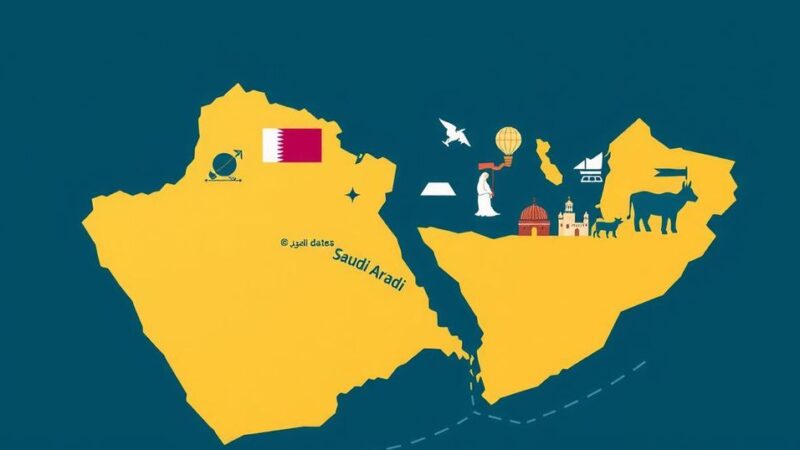President Javier Milei of Argentina has dismissed Foreign Minister Diana Mondino after the nation supported a U.N. resolution calling for the lifting of the U.S. embargo on Cuba. In her place, Gerardo Werthein has been appointed. The dismissal is related to the controversial U.N. vote and reflects Milei’s shift towards a foreign policy that aligns with U.S. and Israeli interests, amidst growing tensions in the region regarding support for Israel. Mondino’s short tenure was marked by controversy, leading to calls for an internal audit within the Foreign Relations Ministry, as the administration aims to solidify its stance on human rights and freedom.
Argentina’s President Javier Milei has dismissed Foreign Minister Diana Mondino, a decision that has come swiftly in the aftermath of the nation’s support for a United Nations resolution advocating for the lifting of the U.S. economic embargo on Cuba. Following this unexpected dismissal, Gerardo Werthein, the current Argentine ambassador to the United States, has been appointed to succeed Mondino, as confirmed by spokesman Manuel Adorni via social media. Although the presidential office did not elaborate on the specific reasons for Mondino’s termination, it has been noted that the dismissal is directly linked to the contentious vote at the U.N. General Assembly. According to a statement from Milei’s office, “Our country is categorically opposed to the Cuban dictatorship, and it will remain firm in promoting a foreign policy that condemns all regimes that perpetuate the violation of human rights and individual freedoms.” The United Nations resolution aimed at lifting the embargo received the backing of 187 nations, while only the United States and Israel opposed it, underscoring a significant international consensus on the matter. Since assuming office in December 2023, President Milei has recalibrated Argentina’s foreign policy to align more closely with the interests of the United States and Israel. His vocal support for Israeli Prime Minister Benjamin Netanyahu amidst the latter’s military actions in Gaza contrasts sharply with the stances taken by many Latin American nations, which have criticized Israel’s actions. Countries such as Bolivia and Colombia have severed ties with Israel, while several other nations, including Brazil, have recalled ambassadors from Tel Aviv, highlighting the growing regional rifts on this contentious issue. Mondino’s brief time as Foreign Minister has been fraught with challenges, including a public relations misstep where her office issued a retraction of a press release after mistakenly using the term “Falklands” rather than “Malvinas,” the term used in Argentina to refer to the disputed territory. Additional controversy arose in May when she made a racially insensitive comment during a visit to China, stating that, “all Chinese look like the same,” which further contributed to the perception of instability within the Foreign Relations Ministry. In light of Mondino’s departure, the Milei administration has announced plans for an internal audit of the Foreign Relations Ministry aimed at identifying personnel endorsing agendas that clash with the government’s narrative on freedom and human rights. As Argentina navigates this period of transition, the longer-term implications for its foreign relations remain uncertain, yet it is clear that Milei’s government is poised to redefine its international stance within an evolving geopolitical landscape, which may have significant repercussions for its relationships with both allies and adversaries.
The political landscape in Argentina has shifted significantly under the leadership of President Javier Milei, who took office in December 2023. His presidency has been characterized by a decisive pivot towards aligning Argentina’s foreign policy with the United States and Israel. This shift is evident in his administration’s positions on various international issues, particularly regarding regions like the Middle East and governance issues in Latin America. The dismissal of Foreign Minister Diana Mondino following a controversial U.N. vote reflects these changes, especially in relation to Cuba and the ongoing complexities surrounding U.S. foreign policy mandates. Mondino’s term was marked by various controversies that questioned her diplomatic prudence and overall foreign policy alignment under Milei’s governance, leading to her swift removal after a significant policy implementation that contradicted the administration’s core values. An internal audit of the Foreign Relations Ministry suggests a deeper investigation into aligning government policies with Milei’s distinct foreign policy objectives.
In conclusion, the rapid dismissal of Foreign Minister Diana Mondino underscores the precariousness of Argentina’s foreign policy landscape under President Javier Milei. The administration’s alignment with U.S. and Israeli interests marks a significant departure from previous diplomatic stances, particularly visible in the recent United Nations vote against the U.S. embargo on Cuba. Mondino’s tenure, marred by various controversies, serves as a focal point for the ongoing internal adjustments within the government, especially as Milei’s administration sets out to reevaluate its approach to international relations. The implications of these changes are yet to unfold, and Argentina stands at a critical juncture as it navigates its relationships on the global stage.
Original Source: www.newsweek.com






